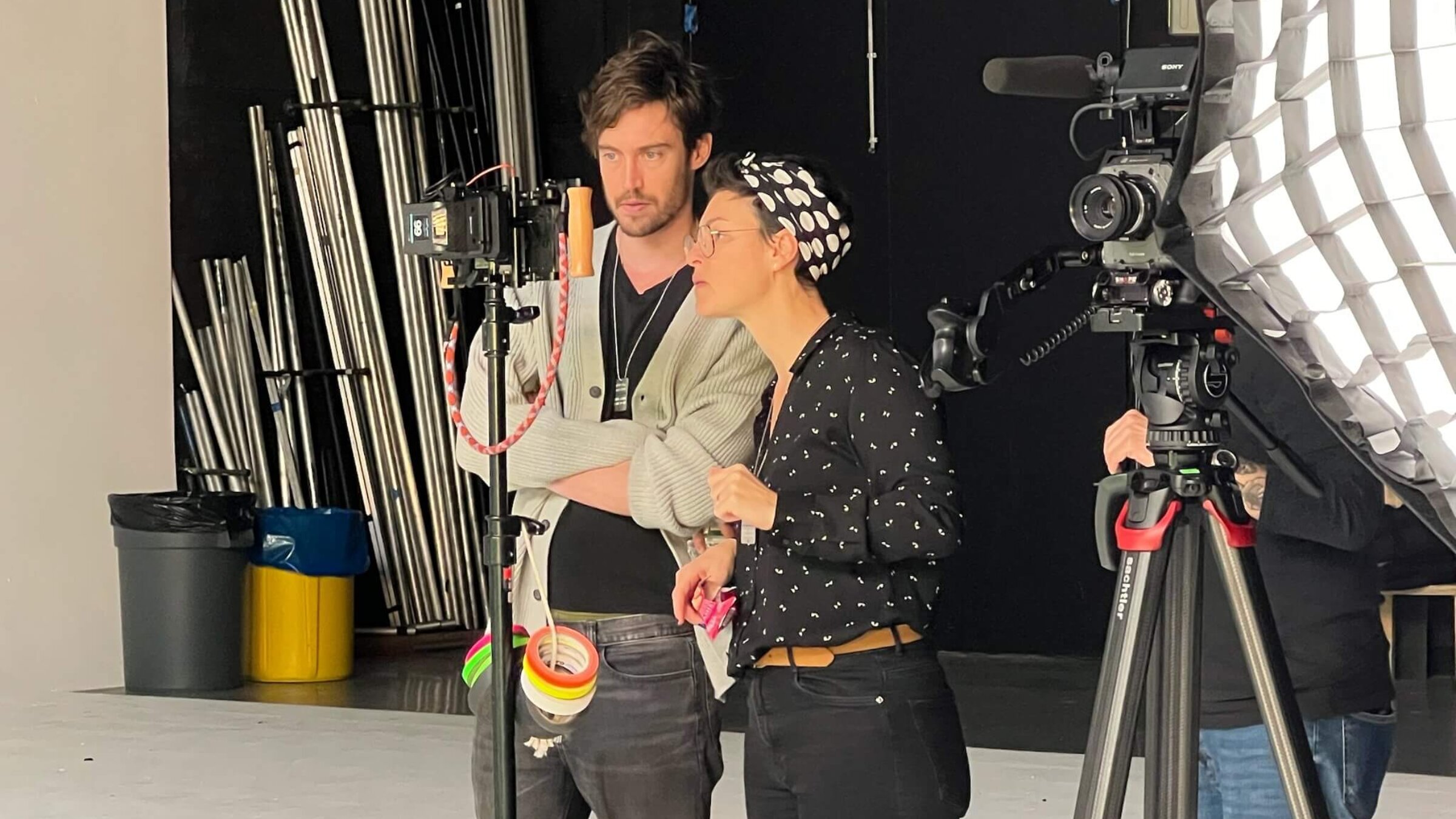‘We know time is running out’: Meet the Israeli filmmakers working to free the hostages
The poignant #BringThemHomeNow videos, produced pro bono, have racked up 150 million views on social media

Tel Aviv Filmmakers Dani Schoffman, left, and Ruth Berdah-Canet on set in January filming a short video seeking hostages’ release. Photo by Zohar Zeev
TEL AVIV — For the 50th day, they made a video starting with “On October 7th, our hearts stopped” and ending with the sound of a heart beating somewhere invisible, off camera. For the 100th, they wove together the nightmares of the hostages’ families — a father waking up breathless at the thought of his son trapped in an airless tunnel, a woman wondering how terrorists might be touching her little sister.
To mark the 150th day of captivity for the 130-some remaining Hamas-held hostages next week, the trio of filmmakers working pro bono for Israel’s Hostage and Missing Families Forum plan to release perhaps their most haunting short yet. It features that same woman, Yarden Gonen, breaking down as she imagines what her sister, Romi Gonen, is still enduring, based on reports from some of the women released in November: rape, no showers or tampons, and “hundreds and hundreds of lice walking on her skull, covering it, literally sucking her blood.”
You’ve likely seen some of the viral #BringThemHomeNow videos the group has made for the highest-stakes social media campaign in Israeli history: 17 of them have run so far, which the creators say have more than 150 million views on social media platforms. Now, with President Joe Biden urging negotiations to seal a deal for a second wave of hostage releases and a six-week ceasefire, they feel the campaign is ever more urgent.
“We know time is running out,” said Ruth Berdah-Canet, a 45-year-old documentarian and ad maker based in Tel Aviv. “We know that every minute, every second we don’t keep raising awareness about the hostages could mean one of them dies. We know because we work here next to their families, who’ve become like our own families and are depending on us to save these people’s lives.”

French-born and U.S.-trained, Berdah-Canet made aliyah four years ago and dropped her paid gigs making commercials for companies and causes to volunteer for the hostage movement in November. She joined two other Tel Aviv-based filmmakers, Dani Schoffman, 34, and Barak Rivkind, 31, who started shooting footage of hostage families right after Oct. 7. They posted their first short video on the forum’s website and social media channels that first week.
The three have been working together, without pay, in the forum’s central Tel Aviv headquarters, borrowed from a cybersecurity firm. Families and hostages who were released during a weeklong ceasefire in late November use the four floors of co-working space for meetings and press conferences, as a hub for medical, mental health and legal appointments, and as a place to share home-cooked meals and a good cry with each other and the teams of public relations experts, social media strategists, domestic and international event planners and other volunteers trying to support them.
The forum’s spokespeople have declined to say how much money the group, a nonprofit, has raised overall to advance the families’ and the hostages’ cause. To make each 60-second video, Berdah-Canet said the forum has spent no more than 500 shekels, or about $138 — enough to buy cookies to thank the people who have donated studio space, video equipment and services that, in total so far, would be valued at millions of dollars.
As part of the forum’s broad strategy of trying to make the hostages’ release a higher diplomatic priority, the videos are mostly in English and target Western audiences. It helps that all three filmmakers have lived in the U.S.
A video distributed before Thanksgiving thanked Americans for their concern about the hostages and urged them to write to their elected officials pushing for their release. At Christmastime there were three videos aimed at Christians, one in which the child of a hostage asked Santa Claus to bring his father home, and another, featuring a nativity scene with the baby missing from the crèche, urging viewers to “Remember the true meaning of Christmas.”
“The gift is not in the presents, but in the presence,” it says. “138 hostages are still held by Hamas. Pray. Give. Speak up. Help reunite them with their families.”
For New Year’s, a video contrasted a countdown to midnight at a party with the tallies captives are said to have scratched into walls to keep track of time. “For hostages held by Hamas,” it says, “every second could be the last.”
Yet another video, made of video clips from the Oct. 7 massacre, asserts “The biggest horror movie of the year wasn’t a movie at all.”
Terror and grief ground most of the shorts, which have an aching spareness that makes viewers feel the hostages’ absence. After the release of more than 100 hostages, the team produced a montage of family reunions that could make even the most hardened negotiator tear up.
“We were all kind of starstruck,” Schoffman said about meeting in person the released hostages he knew mainly from having edited their families’ old videos.

The filmmakers pivoted to satire over Super Bowl weekend, with help from Jewish-American actor and comedian Michael Rapaport. In one ad mocking misinformation spread by Hamas, Rapaport plugs “Hamas Hot Wings” made with “100% pure grass-fed Hamas shit.”
“Yes that is actual shit you are eating,” he tells the “taste-testers,” one played by Berdah-Canet. “Hamas is full of shit and anyone who tells you elsewise is also full of shit. Listen, if you want some Hamas shit, go on social media, go to a rally. It’s everywhere.”
In two other videos — one a teaser for the other — Rapaport spoofs a faux ad for a faux self-help app that a faux network refused to air. They play off Americans’ obsession with Super Bowl commercials, and the perception among some Israelis that Americans are turning their backs on Israel.
“And I thought the Jews controlled the media!” Rapaport says in one.
Because the forum seeks to inspire hope for the hostages’ release, the filmmakers said, they avoid images that are too graphic — or messages that are too cynical. And because hostage families have wide-ranging views about Israeli politics, the team avoids addressing the policies of Prime Minister Benjamin Netanyahu and his right-wing government.
Schoffman and Rivkind, who grew up together in Jerusalem’s German Colony, said that the Oct. 12 resignation of Netanyahu’s information minister had left a hole in the public-diplomacy efforts around the hostages and the broader conflict. Both are leftists and oppose Netanyahu’s handling of the war — “I wouldn’t even do reserve duty,” Rivkind said. And both agree no cause other than the hostages’ release would have inspired them to volunteer.
Rivkind was working on a documentary about his father, the acclaimed Israeli trauma surgeon Avraham Rivkind, before Oct, 7. Schoffman, son of the late writer and translator Stuart Schoffman — who occasionally contributed to the Forward — was producing documentaries, commercials and music videos until the Hamas attack.
Besides the video slated for release on the 150th day of captivity on Tuesday, the filmmakers have been finalizing one focused on male hostages, who have generally drawn less attention than the women and children. It strings together quick takes of a dozen male Israeli celebrities, including Shtisel actor Sasson Gabai, mentalist Lior Suchard and chef Assaf Granit, talking about male vulnerability.
“Men, too, are afraid of the dark,” one starts in Hebrew, with English subtitles.
“Men, too, break down and cry,” says another.
“Men, too, shiver when they’re cold. Men, too, starve from hunger … Men, too, hurt when they are bruised … Men, too, need air to survive. Men, too, miss their mother.
“Bring them home. All of them. Now.”
The piece strikes a chord at a time when the fragility of a nation known for its military and machismo has been laid bare.
“We’ve been exposed in our vulnerability,” Rivkind said. “We tried to show how delicate this situation is. We tried to show something fine and course all at once.”

Berdah-Canet said she had aimed to recruit American celebrities for a U.S. version of the “Men, too” video, but that most of her contacts — Jews and non-Jews — from more than a dozen years making films in the U.S. have ghosted her either because they oppose the war in Gaza or feel it’s too risky professionally for them to appear as if they support Israel.
“They’ve lost themselves,” she said.
At the same time, Berdah-Canet said she doesn’t want the spot to be seen as an effort to counterbalance viral videos showing brutality by Israeli soldiers in Gaza or soften criticisms about the number of civilians killed there. “I’m not interested in making videos about respectable Jews whose hearts beat and the world can love,” she said. “I piss on respectability.”
She called the experience of working on the hostage videos “my defining moment.” The video in which Yarden Gonen, 30, listed her fears for her sister, who was abducted from the Nova music festival, and 18 other women still held hostage, was shot in Berdah-Canet’s own home, on her own bed. The filmmaker was able to at once record and comfort her subject.
“This is where all my skills come together,” she said. “Everything I’ve done in my life has led me here to try to bring these hostages home, or to at least show my kids and grandchildren we do not give up on our people and we don’t ever leave them behind.”
A message from our Publisher & CEO Rachel Fishman Feddersen

I hope you appreciated this article. Before you go, I’d like to ask you to please support the Forward’s award-winning, nonprofit journalism so that we can be prepared for whatever news 2025 brings.
At a time when other newsrooms are closing or cutting back, the Forward has removed its paywall and invested additional resources to report on the ground from Israel and around the U.S. on the impact of the war, rising antisemitism and polarized discourse.
Readers like you make it all possible. Support our work by becoming a Forward Member and connect with our journalism and your community.
— Rachel Fishman Feddersen, Publisher and CEO




























